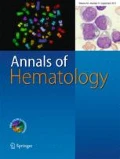
References
Niu JY, Tian T, Zhu HY, Liang JH, Wu W, Cao L, Lu RN, Wang L, Li JY, Xu W (2018) Hyperfibrinogenemia is a poor prognostic factor in diffuse large B cell lymphoma. Ann Hematol 97:1841–1849
Ridker PM, Howard CP, Walter V et al (2012) Effects of interleukin-1beta inhibition with canakinumab on hemoglobin A1c, lipids, C-reactive protein, interleukin-6, and fibrinogen: a phase IIb randomized, placebo-controlled trial. Circulation 126:2739–2748
Taniguchi K, Karin M (2014) IL-6 and related cytokines as the critical lynchpins between inflammation and cancer. Semin Immunol 26:54–74
Pardanani A, Finke C, Lasho TL et al (2012) IPSS-independent prognostic value of plasma CXCL10, IL-7 and IL-6 levels in myelodysplastic syndromes. Leukemia 26:693–699
Sahni A, Simpson-Hanidaris PJ, Sahni SK et al (2008) Fibrinogen synthesized by cancer cells augments the proliferative effect of fibroblast growth factor-2 (FGF-2). J Thromb Haemost 6:176–183
Sahni A, Khorana AA, Baggs RB et al (2006) FGF-2 binding to fibrinogen is required for augmented angiogenesis. Blood 107:126–131
Sahni A, Francis CW (2000) Vascular endothelial growth factor binds to fibrinogen and fibrin and stimulates endothelial cell proliferation. Blood 96:3772–3778
Witsch E, Sela M, Yarden Y (2010) Roles for growth factors in cancer progression. Physiology (Bethesda) 25:85–101
Author information
Authors and Affiliations
Corresponding author
Ethics declarations
Conflict of interest
All authors declare that they have no conflict of interest.
Ethical approval
All procedures performed in studies involving human participants were in accordance with the ethical standards of the institutional and/or national research committee and with the 1964 Helsinki Declaration and its later amendments or comparable ethical standards.
Statement of informed consent
Informed consent was obtained from the patients. The study was approved by the Ethics Committee of Yokohama Municipal Citizen’s Hospital.
Additional information
Publisher’s note
Springer Nature remains neutral with regard to jurisdictional claims in published maps and institutional affiliations.
Rights and permissions
About this article
Cite this article
Ogura, S., Yonei, S., Tanigawa, T. et al. Prognostic significance of hyperfibrinogenemia in patients with lower-risk myelodysplastic syndromes. Ann Hematol 99, 189–191 (2020). https://doi.org/10.1007/s00277-019-03863-z
Received:
Accepted:
Published:
Issue Date:
DOI: https://doi.org/10.1007/s00277-019-03863-z

